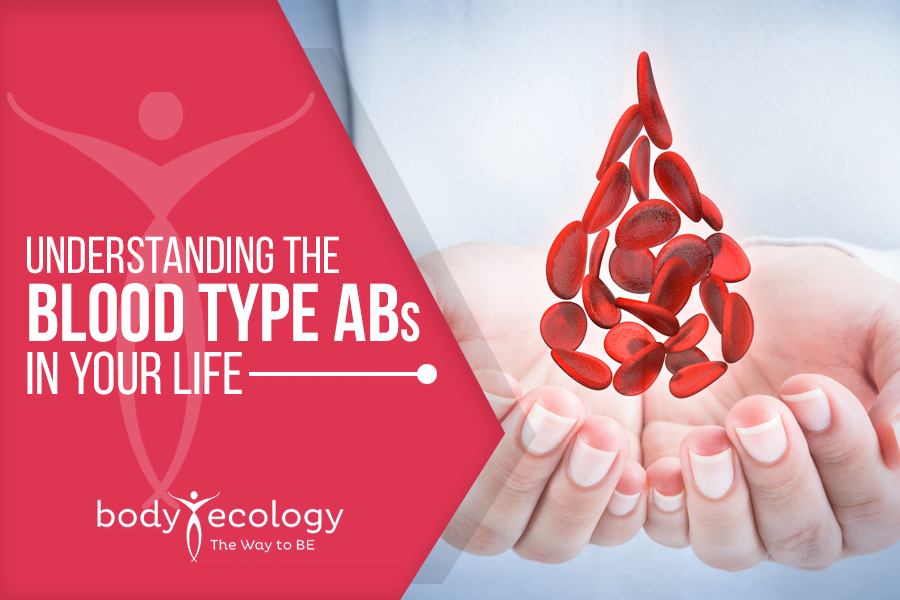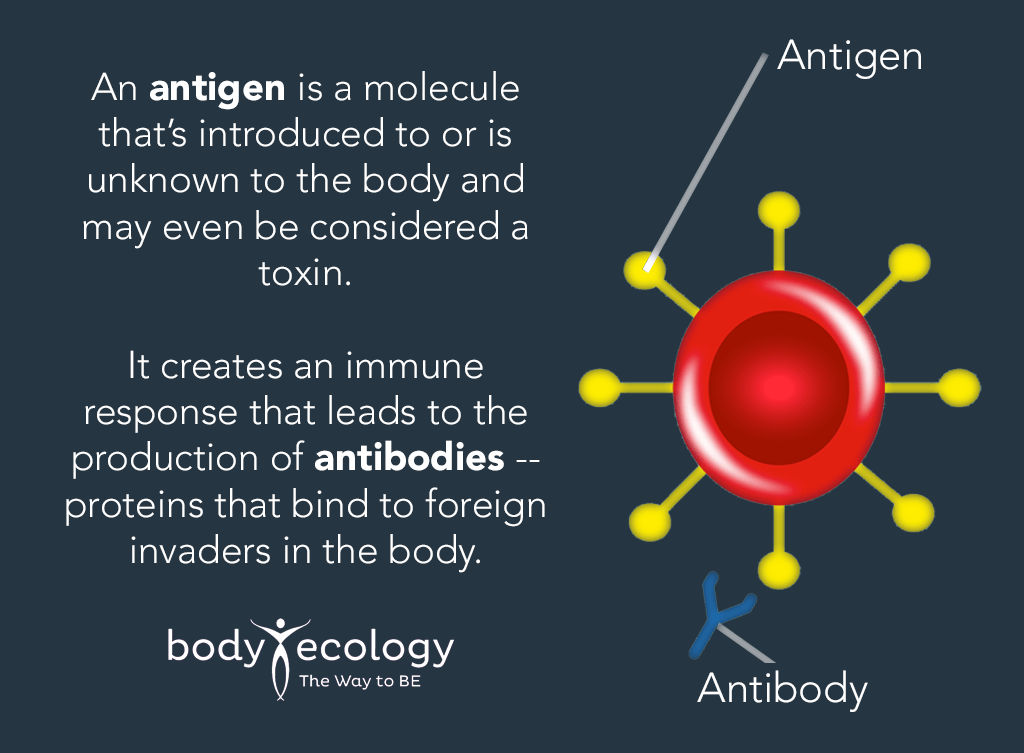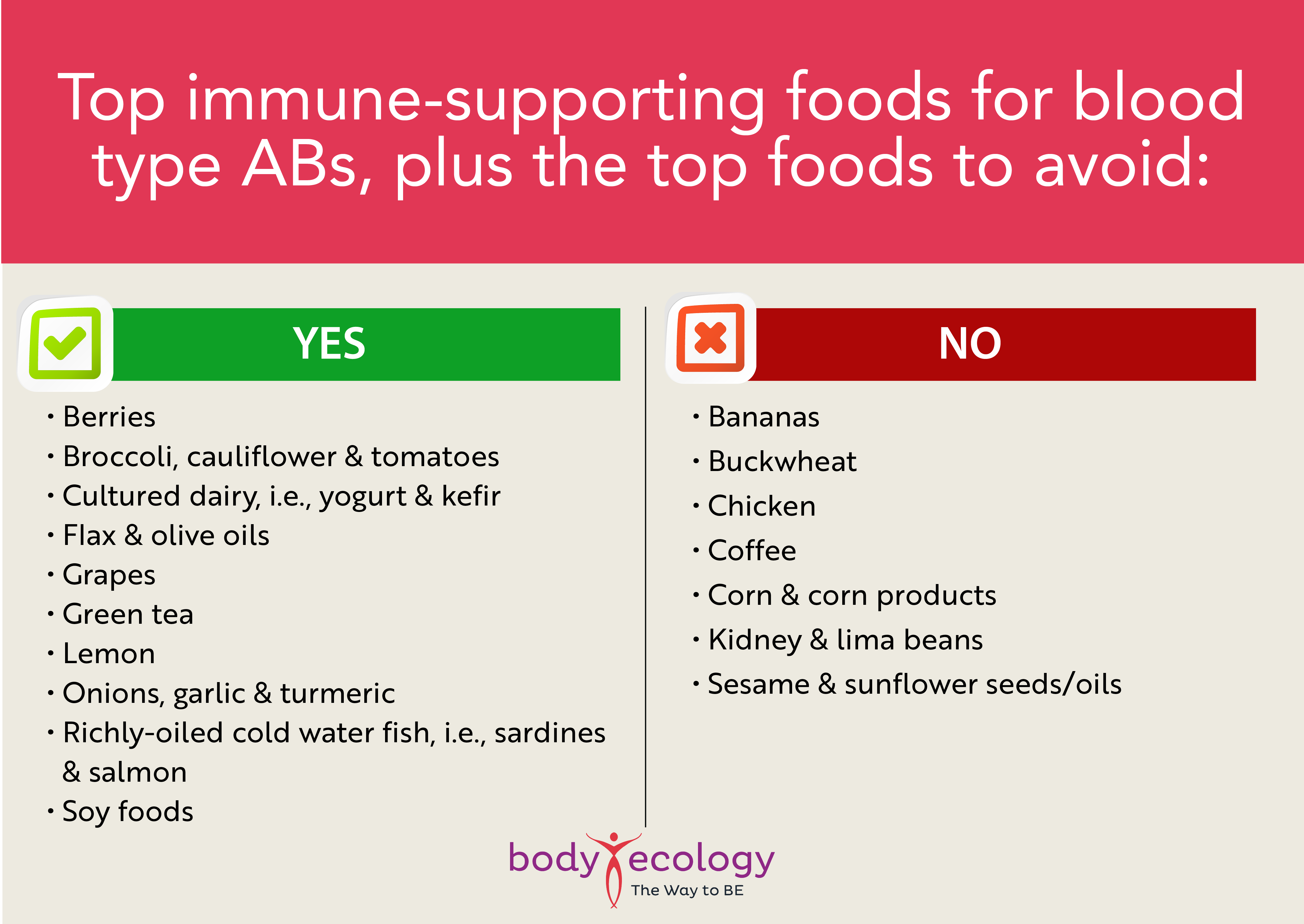
Body Ecology blood type series: Living life as an AB
If you (or someone you know) are an AB blood type, know that ABs have their own distinct characteristics that just might make them one of the most interesting of the blood types. We’re not only talking about the composition of your blood — AB blood types have other unique traits not found in As, Bs, or Os.

Just like blood type A or type B, which we reviewed in our two prior articles in our blood type series, an AB’s special biochemistry can influence everything from their approach to exercise, to what foods are best to eat, to determining what diseases or conditions for which they may be at risk and how those might be mitigated.
Free download: Get the Body Ecology blood type ebook.
Would it benefit ABs to know more about their blood type than just the name of the antigen contained in their blood? We think so.
In fact, one chapter in The Body Ecology Diet: Recovering Your Health and Building Immunity is entirely devoted to blood types.
Our differing blood types are just one more thing that makes us each unique. And since Body Ecology’s System of Health and Healing is based on 7 Universal Principles, the Principle of Uniqueness is a law that we always honor in Body Ecology.
The foundation for that chapter and the articles in this series draws from the work of Dr. Peter D’Adamo’s 1996 book, Eat Right for Your Type: 4 Blood Types, 4 Diets.1
Since its publication, Eat Right for Your Type has drawn praise and criticism from different corners of the medical community, yet that same medical community is still studying Dr. D’Adamo’s work 25 years later. Perhaps there is something to it?
The medical establishment has weighed in on D’Adamo’s theory, conceding that your unique biochemistry might reveal the basis for disease, optimal aging, exercise prescription, and even emotional resilience — but stops short of declaring a direct correlation between blood type and what foods are right for each type.2
In this article, we’ll delve into some of these factors, and if you’re blood type AB, you can decide for yourself if these characteristics fit you.
All about ABs: An in-depth look at diet, exercise & personality
In our last article on blood type B, we shared that the ABO Blood Group System was discovered in 1900 by (Austrian-born) American researcher Karl Landsteiner.3
Landsteiner classified blood based on identification of antigens:
- An antigen is a molecule with specific characteristics, particularly on its surfaces (known as epitopes).
- Each antigen operates differently in terms of immune response.
- Blood type classification depends on whether the surface of a red blood cell(s) contains Antigen A or B.
- With AB blood types, both A and B antigens are present on red blood cell surfaces.
For example, type B+ blood can be donated to either blood type B+ or to blood type AB+ recipients. B- (negative) patients are only able to receive blood from other B- (negative) donors. Someone who’s given the wrong blood during a blood transfusion may experience their body attacking the “foreign invader” with potentially fatal consequences.
Blood type is inherited and, like hair color, is passed down genetically from your parents. If your mother, for instance, is blood type A, and your father is blood type B, you could potentially be blood type A, B, or AB. And if your biological mother is an A, and your biological father is an AB, you could also have A, B, or AB blood.
Does this make your head spin? Hang in there, and we’ll get to what makes ABs special. But perhaps first, you should know that, as an AB, you do not have any A or B antigens on the surface of your red blood cells, so you do not create antibodies and are a “universal recipient.”

Type O blood does not have antigens for either A or B types, so Os can donate to all blood types. Os are the universal donor.
Now, what about that + and -? This is called the “Rhesus factor” and can also be found on the surface of the red blood cells. (It’s sometimes called the “antigen D.”) This is the distinguishing “-“ or “+” written right after the letter of the blood type.
So, AB- means that the person is “negative” and their blood does not contain the Rh factor. AB- (negative) patients are only able to receive blood from other AB- (negative) donors. Here in the U.S., less than 4 percent of us are AB + (positive), so AB is a rare blood type. But AB- (negative) is very rare indeed.

-
Type AB personality.
According to Dr. D’Adamo, blood types developed over years of human history in response to different factors in human environments. Type AB developed most recently, relatively speaking, and is a rare type.
Looking at the Type AB personality, we return to our friends, the Japanese, who take blood types very seriously:
- They believe blood type is so important it can indicate what romantic partner is the best match or what job position is right for you, depending on your type.
- Not surprisingly, the Japanese describe the personality of blood type ABs as a combination of the A and the B personality — in a word, “eccentric.”
- ABs are complicated. Like Type As, ABs can be shy. But like Type Bs, they’re also extroverted. This makes it more difficult to figure them out.
Other personality traits attributed to ABs include: gifted, serene, sensible, inventive, reserved, level-headed, controlling, friendly, disapproving, tentative, and absent-minded. (Hmm, even more difficult to figure them out.)
-
Type AB exercise.
Given the mixed nature of blood type AB, the ideal exercise recommendations for an AB combine activities from Type A and Type B:1
- Type As, if you read our first article, can be prone to muscle and joint stiffness. They don’t do well with high-impact cardio-type activities. Their preferred mode of exercise is less intense and may include walking, hiking, golf, or certain styles of dance.
- Also related to their type A side, blood type ABs tend to bottle up emotions. So, fluid, calming exercises like yoga and tai chi can help ABs to be more emotionally stable. This also addresses the need to keep joints protected and flexible.
- Type Bs, as mentioned in our second article, tend to have high energy levels and benefit from ways to burn off some surplus energy. They may experience exercise more as a means of regulating this abundance of energy, which can overrun their brains and make them prone to stress and anxiety.
- Regular exercise is a must for Type Bs. Activities with a social aspect are ideal for Type Bs, says D’Adamo. Examples include cycling, hiking, or tennis.
Put together, exercise recommendations for Type ABs look like a mix of both blood groups A and B: jogging or cycling for 40 to 60 minutes, three times per week, combined with yoga and/or tai chi on alternate days.1 Meditation would be a plus for any blood group, but ABs, in particular, would benefit.
-
Type AB diet.
Whether your blood type is AB+ or AB-, following a carefully designed diet based on the AB blood type may potentially provide health protection:
- Taking blood type into consideration, Dr. D’Adamo declared that individuals will react differently to specific foods due to the presence of lectins in those foods and how lectins can affect the blood.1
- Lectins are sticky, carbohydrate-binding proteins found in nearly all foods, but especially plant foods. Many are cooked out of food, but many are not.
- Lectins are so specific in their biochemical characteristics that they can even be distinguished among blood subgroups. They can impact body systems, such as digestion, joint health, immune function, and even metabolism.4,5
But such proteins are not all “bad.”6 In the plant world, many lectins have insecticidal and antifungal properties, which help protect the plant or host.7
Lectins are also in grains, particularly gluten-containing wheat products. With 20 million Americans suffering some degree of gluten sensitivity, this can be problematic; lectins may attach to intestinal cells, possibly causing inflammation and gut permeability, or leaky gut, instead of supporting the microbial environment as some lectins can do.8,9
Fermentation is the ancient way our ancestors preserved foods and ensured a healthy inner ecosystem. During fermentation, bacteria and yeast break down carbs (sugars and starches), producing acids that result in a distinctive sour taste.
These foods are your best bet to help dampen the inflammatory response and resulting leaky gut from lectin in your foods.10 So, be sure to include plenty of fermented foods and probiotic beverages in your diet.
Body Ecology’s Vitality SuperGreen may be especially helpful in combating the damage caused by some lectins. To help support the healing of gut mucosa and, thus, improve intestinal permeability, enjoy Vitality SuperGreen in between meals.11
Dr. D’Adamo’s work has uncovered that all blood types have specific foods they should avoid:
- Dr. D’Adamo recommends that Type ABs eliminate chicken, cornmeal, bell pepper, and fava beans as the lectins in these foods are particularly undesirable for ABs.
- He advises against ABs eating bacon, veal, quail, and some other meats.
- Dairy products, such as butter, buttermilk, and a variety of cheeses, should be avoided too.
- Pumpkin, sunflower, and sesame seeds should ideally be eliminated, along with certain fruits and vegetables.
- The chart on this page provides a complete list of foods to limit.

Those with AB blood type may be reactive to even more foods, such as processed, smoked, and cured meats. ABs should steer clear of these foods altogether since this type naturally produces less stomach acid, making them more at risk than other blood types for stomach cancer.1
Eat your way to great health: Download our free guide, featuring 8 satisfyingly sugar-free recipes.
Many ABs may experience compromised digestion due to low stomach acid production, a propensity they likely inherited from Type As.1 ABs also seem to struggle with meat in their diet, something that matches the Type B side of them. (Because of their low levels of stomach acid, meat does not get digested well.)
Type ABs will benefit from eating smaller, more frequent meals — which are more easily digested — when dealing with inadequate stomach acid and low digestive enzyme levels. (Taking our digestive enzymes at each meal is an easy way to help replenish.)
Dr. D’Adamo also recommends combining certain foods that can slow down the digestive process. ABs, for example, will have a better time digesting if they eat proteins and starches separately.
Why ABs are the unicorn of blood types in Japan
Blood type AB is somewhat rare, especially in Japan. You most likely will find it difficult to come across an AB in Japan, where 57 percent of the Japanese are blood type A. As like to conform and work together in groups, where ABs are independent, free-spirited, and unconventional. You can see why ABs have the label of “eccentric.”
After years of research, the obsession with blood type continues. In Japan, you can purchase products that are centered around your blood type. For example, Aboba is a series of condoms based on blood type. The condom is chosen for the partner’s blood type and is said to come packaged with relationship advice.
Bandai is a Japanese toy company that makes blood type chocolates based upon the different types. The chocolate is packaged in a wrapper that makes fun of the personalities associated with each blood type (10 pieces of chocolate in all).
Obsession indeed.
Free download: Get the Body Ecology blood type ebook.
REFERENCES:
- 1. DAdamo, Peter, and Catherine Whitney. Eat Right 4 Your Type (Revised and Updated): The Individualized Blood Type Diet® Solution. New American Library, 2016.
- 2. Ewald DR, Sumner SC. Blood type biochemistry and human disease. Wiley Interdiscip Rev Syst Biol Med. 2016;8(6):517-535. doi:10.1002/wsbm.1355.
- 3. Farhud DD, Zarif Yeganeh M. A brief history of human blood groups. Iran J Public Health. 2013;42(1):1-6.
- 4. Skoczyńska M, Świerkot J. The role of diet in rheumatoid arthritis. Reumatologia. 2018;56(4):259-267. doi:10.5114/reum.2018.77979.
- 5. Vasconcelos IM, Oliveira JT. Antinutritional properties of plant lectins. Toxicon. 2004 Sep 15;44(4):385-403. doi: 10.1016/j.toxicon.2004.05.005. PMID: 15302522.
- 6. Rhodes, Jonathan. (1999). Genetically modified foods and the Pusztai affair. BMJ (Clinical research ed.). 318. 1284. 10.1136/bmj.318.7193.1284.
- 7. Mishra A, Behura A, Mawatwal S, et al. Structure-function and application of plant lectins in disease biology and immunity. Food Chem Toxicol. 2019;134:110827. doi:10.1016/j.fct.2019.110827.
- 8. Leonard MM, Sapone A, Catassi C, Fasano A. Celiac Disease and Nonceliac Gluten Sensitivity: A Review. JAMA. 2017 Aug 15;318(7):647-656. doi: 10.1001/jama.2017.9730. PMID: 28810029.
- 9. Cash HL, Whitham CV, Behrendt CL, Hooper LV. Symbiotic bacteria direct expression of an intestinal bactericidal lectin. Science. 2006 Aug 25;313(5790):1126-30. doi: 10.1126/science.1127119. PMID: 16931762; PMCID: PMC2716667.
- 10. Milajerdi A, Mousavi SM, Sadeghi A, Salari-Moghaddam A, Parohan M, Larijani B, Esmaillzadeh A. The effect of probiotics on inflammatory biomarkers: a meta-analysis of randomized clinical trials. Eur J Nutr. 2020 Mar;59(2):633-649. doi: 10.1007/s00394-019-01931-8. Epub 2019 Mar 11. PMID: 30854594.
- 11. van der Hulst RR, van Kreel BK, von Meyenfeldt MF, et al. Glutamine and the preservation of gut integrity. Lancet. 1993;341(8857):1363-1365. doi:10.1016/0140-6736(93)90939-e.








